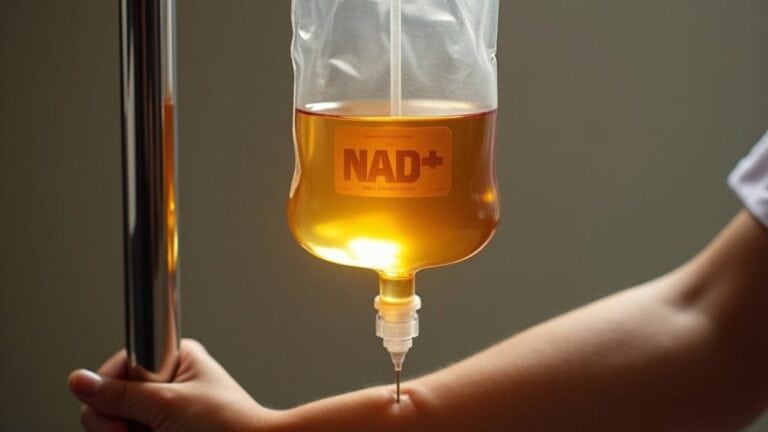Methylene blue has quietly made its mark in medicine for over a century, but its potential for brain health is only now gaining attention. This vibrant compound works at the cellular level, helping mitochondria produce energy more efficiently while protecting neurons from oxidative stress.
Studies suggest it can sharpen memory, amplify focus, and even slow cognitive decline, offering hope for those seeking mental clarity. With proper dosing, it might become a key player in brain wellness strategies. The science behind its benefits keeps unfolding, revealing surprising possibilities for cognitive support.
The Historical Journey of Methylene Blue in Medicine
Methylene blue has been a trusted ally in medicine for over a century, initially making its mark as a malaria treatment in the late 1800s. Its striking blue color and unique chemical properties quickly caught the attention of researchers.
Over time, studies revealed its potential beyond malaria, including uses in diagnostics and brain health. Initial research hinted at its ability to support cognitive function, though scientists were still uncovering how it worked.
Today, its role in medicine continues to evolve, with modern investigations exploring its neuroprotective properties. From its humble beginnings as an antimalarial agent to its current status in brain-related research, methylene blue’s path reflects its versatility. Its endurance in medicine highlights its potential to address both historical and emerging health challenges.
Enhancing Cognitive Performance With Methylene Blue
Research suggests methylene blue can improve memory retention by supporting the brain’s ability to store and recall information.
It also appears to sharpen focus, helping individuals maintain concentration during mentally demanding tasks. These cognitive benefits make it a potential option for those seeking to bolster mental performance.
Boosting Memory Retention
Although memory lapses can feel annoying, emerging insights suggest methylene blue could offer a solution by sharpening the brain’s ability to hold onto information. Research indicates that methylene blue improves memory retention by optimizing mitochondrial function, which fuels cognitive processes. Its neuroprotective properties help safeguard brain cells, potentially slowing age-related decline.
Sharpening Focus Levels
As the mind feels scattered or sluggish, remaining on task can become a struggle, but methylene blue can offer a way to sharpen focus. By boosting ATP production in brain cells, it supports energy levels, which helps maintain mental clarity and diminishes fatigue. Studies suggest methylene blue takes protective action against oxidative damage, further preserving brain function. Its effects on attention and focus make it useful for demanding cognitive tasks, helping individuals stay engaged and productive. Below is a table summarizing its key benefits for focus:
| Function | Effects | Mental Benefits |
|---|---|---|
| Boosts ATP | Sustains energy | Improves concentration |
| Protects cells | Reduces oxidative damage | Supports long-term focus |
| Enhances circulation | Optimizes brain function | Sharpens attention |
| Balances neurotransmitters | Stabilizes mood | Reduces distractions |
| Supports mitochondria | Increases mental stamina | Prolongs task endurance |
These mechanisms work together to help the mind stay sharp and attentive.
Methylene Blue’s Role in Brain Oxygenation
Since the brain relies heavily on oxygen to function properly, methylene blue steps in as a powerful helper, making certain every part gets the fuel it needs. It boosts mitochondrial efficiency by acting as an electron carrier in the electron transport chain, assisting brain cells produce more cellular energy.
By improving oxygen delivery, it reduces oxidative damage and supports neuroprotective effects. This means sharper contemplation, better concentration, and healthier brain function overall. Methylene blue’s ability to amplify oxygen flow guarantees neurons work at their best, preventing sluggish mental performance.
It’s like giving the brain a steady supply of high-quality fuel, keeping cognitive engines running smoothly. For anyone looking to support brain health, comprehension of this process highlights why methylene blue is gaining attention as a cognitive enhancer.
Disclaimer: Do not take this without consulting your doctor. Always speak with your healthcare provider first.
Neuroprotective Effects Against Cognitive Decline
As the situation demands protecting the brain from decline, methylene blue offers a promising shield against damage linked to conditions like Alzheimer’s and dementia. Research suggests methylene blue supports brain health by reducing oxidative stress, a key factor in neuron damage.
Methylene blue acts as an antioxidant, protecting brain cells from harmful free radicals while boosting energy production in mitochondria. This dual action can slow cognitive decline by improving cellular resilience. Additionally, studies highlight its potential to prevent tau protein buildup, a marker of Alzheimer’s.
Methylene blue enhances mental clarity and might combat chronic fatigue, helping individuals maintain sharper focus. Its neuroprotective effects make it a compelling option for those seeking to preserve cognitive function as they age.
Integrating Methylene Blue Into Daily Wellness Routines
Timing methylene blue intake can influence its cognitive benefits, with many finding morning doses ideal for sustained mental clarity. Pairing it with nootropics like lion’s mane or citicoline can augment focus and memory support.
Lifestyle habits such as intermittent fasting or aerobic exercise can further potentiate its effects on brain health.
Optimal Dosage Timing
Taking methylene blue at the right time can make a big difference in how well it works. This powerful tool for enhancing brain health and energy levels requires careful timing to maximize its benefits while minimizing side effects. As a chemical compound that protects cells from damage, its effects of methylene blue are best harnessed with consistency. Always consult a healthcare provider before adjusting timing or dosage.
To optimize its impact:
- Morning surge: Take it at the start of the day to align with natural energy peaks.
- Split doses: Smaller amounts spread throughout the day maintain steady support.
- With meals: Improves absorption and eases digestion.
- Pair wisely: Combining with coffee can amplify focus without risking cognitive decline.
Timing transforms methylene blue from helpful to transformative.
Complementary Nootropic Pairings
Several nootropics work even better when combined with methylene blue, creating a powerful boost for brain health and energy. Pairing methylene blue with CoQ10 or NAD+ bolsters mitochondrial support, optimizing cellular function and mental performance.
Its antioxidant properties also complement other supplements that reduce oxidative stress, crafting a balanced approach to cognitive enhancement. Red light therapy amplifies methylene blue’s effects by promoting cellular repair and energy production.
Customized protocols, guided by a practitioner, can fine-tune these combinations to address specific needs like inflammation or metabolic backing. Whether used with nootropics for focus or therapies for cellular vitality, methylene blue integrates seamlessly into wellness routines, offering a versatile tool for boosting cognitive resilience and overall well-being.
Lifestyle Synergy Benefits
Since methylene blue works best as soon as paired with supportive habits, integrating it into a daily wellness routine can reveal its full cognitive and neuroprotective potential. Combining it with practices that augment mitochondrial health and mental clarity creates a powerful synergy for brain optimization.
- Meditation & Breathwork – Calming the mind reduces oxidative stress, letting methylene blue’s neuroprotection shine.
- Red Light Therapy & HIIT – Boosting mitochondrial health amplifies energy production, working hand-in-hand with methylene blue.
- Adaptogenic Herbs & Omega-3s – These support stress resilience and brain structure, complementing methylene blue’s benefits.
- Antioxidant-Rich Foods – Fighting free radicals helps methylene blue maintain brain cell integrity longer.
Safety and Dosage Guidelines for Optimal Use
Proper use of methylene blue requires attention to safety and dosage to maximize benefits while minimizing risks. Pharmaceutical-grade methylene blue is essential, as industrial or aquarium-grade versions could contain harmful impurities.
For overall cognitive support, typical doses range from 1-4 mg daily, but amounts above 4 mg should only be taken under a healthcare professional’s direction. Those combining it with light therapy (RLT) or medications like SSRIs must be cautious due to the risk of serotonin syndrome.
Temporary blue urine or skin discoloration is normal, but individuals with G6PD deficiency should avoid it entirely to prevent serious complications. Consulting a doctor guarantees safe use, especially for age-related cognitive concerns. Methylene Blues, when employed correctly, can support brain health without unnecessary risks.
Conclusion
Methylene blue’s potential to protect and augment brain health is remarkable—but could this humble dye hold the key to keener cognition as we age? From boosting oxygen flow to shielding neurons, its benefits are backed by science. Yet, like any tool, it works best with careful use. As research continues, one thing becomes clear: sometimes, the most powerful solutions have been hiding in plain sight all along.





